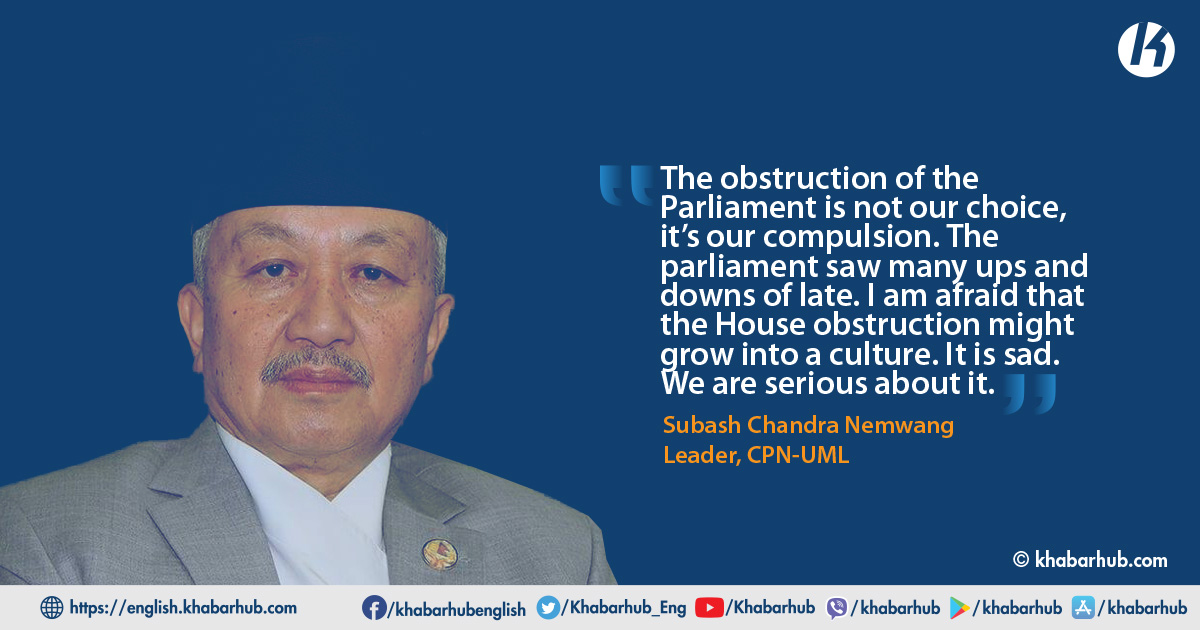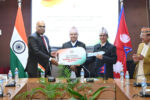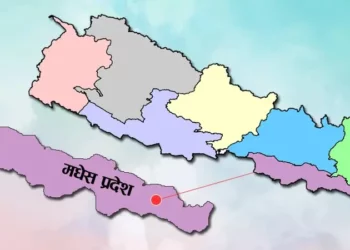The CPN-UML obstructed the regular proceedings of the Federal Parliament that started on Wednesday alleging Speaker Agni Prasad Sapkota for failing to take action against the 14 lawmakers expelled by the party.
Even though the meeting started with the agenda of submitting one and a half dozen ordinances, the government presented only the ordinance related to the party split in the House, even amidst the loud slogans of the UML lawmakers.
After several failed attempts, Speaker Sapkota adjourned the House of Representatives till Tuesday. Talking to Khabarhub as well as Radio Candid’s ‘Candid Talk’, UML’s Deputy leader in the parliamentary party and Chairman of the then Constituent Assembly, Subash Chandra Nembang talked about the House obstruction and the main opposition party’s further strategies. Excerpts of the interview:
Why is the CPN-UML obstructing the regular proceedings of the House of representatives?
The obstruction of the Parliament is not our choice, it’s our compulsion. The parliament saw many ups and downs of late. I am afraid that the House obstruction might grow into a culture. It is sad. We are really concerned about it.
However, there are various factors that have pushed the Constitution and the system at risk.
For example, the parliament, which had been reconstituted at the request of leaders and lawmakers, ended up without any substantive work for more than thirty days.
The government could not give business. We raised the issue of Afghanistan in the parliament and tried to get the attention of the government. “I urge the government to attend the next meeting to inform about this,” the Speaker had then said. That was fine. However, just after a while, he took out a letter from his shelf, it was the letter from the President, and announced the closure of the session.
We guessed the government was planning to introduce the ordinance aimed to split the UML. This is wrong, conspiratorial to end the session of the House and bring the ill-intent ordinance.
We are constantly on the lookout for this. The convention ended at 12 midnight. The next morning, as we said, a cabinet meeting was held and the ordinance was brought. Everyone knows what the ordinance is like.
Amending the erstwhile provision that required at least 40 percent lawmakers for the parliamentary party split, the provision of 20 percent is included in the ordinance.
There was the provision of 20 percent in parliament and the central committee. They amended and replaced ‘parliament and central committee’ with ‘parliament or central committee’.
The provision of threshold is removed as well. There was the provision of submitting property details mandatorily. It was also removed. The ordinance was issued removing all that was needed.
Before the ordinance was issued by the President, our party took action against 14 people including Madhav Kumar Nepal, and registered the information with the Parliament Secretariat and the Election Commission, which means that 14 lawmakers were dismissed by the party before the Ordinance came.
The Speaker and the Parliament Secretariat have no role in the party’s action. The legal provisions and the practice have established so.
What happened to Sarita Giri? Likewise, Top Bahadur Rayamajhi and others who were dismissed by their CPN-Maoist party were announced dismissed by the Parliament Secretariat instantly.
The Speaker and Parliament do not have to do anything about it. They have no such right. When there is the decision of the Central Committee and the parliamentary party, the Secretariat has to fulfill the formality.
If there is the House, it has to be read before the parliament, and when there is no session going on, the Secretariat can just publish the notice.
The Speaker has the time to study, doesn’t he?
Although there is a provision that says to study within 15 days, it does not mean to execute a special study. One can see to verify in a minute whether it is a decision of the Central Committee and whether it has been written down by the parliamentary party or not, to act within 15 days does not mean inaction. That is the optimum limit set for convenience in extraordinary circumstances.
Long before, there was an instance of inaction for two years, but then the law was different. So we changed the rules to stop that.
In the case of the Janata Samajbadi Party and the Maoist Center, the entire work was completed within 48 hours. There is nothing for the Speaker and the Parliament Secretariat to do.
The Election Commission (EC) sends letters asking the Secretariat to seek verification repeatedly. EC’s work is stalled. Again, when the EC validates the party split, the Secretariat completes the study very quickly!
The EC’s letter says it validated the split on the basis of the required percentage of the central members as the percentage of lawmakers did not suffice.
Without reading the letter of the EC, Speaker wrote to UML that the Secretariat need not take action now. It indicates that the Speaker just passed the time. That is inaction. Our question is can a speaker do so?

That means you blame the Speaker for inaction in the case of defecting UML leaders, and say he is responsible for the chaos in the parliament, is it so?
There is no dispute in this. The Speaker is the leader of the Parliament. The leader of the parliament is the leader of all of us.
When a lawmaker becomes a Speaker, he is the leader of all parties. Look at the rules of procedure of the House of Representatives and the National Assembly.
He can facilitate all the activities in the parliament making them conducive for all the parliamentary parties. He is expected to act that way, but, in our case, it became objectionable when the Speaker failed to execute the role of guardian.
UML lawmakers became suspicious of the conduct of the Speaker because he seemed to adopt a dual standard; acting in favor of some parties like JSP and Maoist Center; he seemed biased against UML.
Leaders, including Madhav Kumar Nepal, have formed the CPN-Unified Socialist, which has also been recognized as a national party. What can be the role of the Speaker effective in the coming days?
I have said that the Speaker should be the leader of all. Everyone needs to be reassured. Another thing, even now, our letter registered at the Parliamentary Secretariat is waiting for action.
The Secretariat has said there is no need to take action, for the time being, what about it afterward. Our point is it has to be addressed.
We were in power yesterday. Today we are fulfilling the responsibility of the main opposition. We have taken the power transfer very easily. Despite our reservation on the response relating to our answer to the Supreme Court, we abided by the Court’s decision. We have taken to protest seeking justice.
To take just one example, amid your protests in the Parliament, the government has tabled an ordinance on party split. What will be the condition of the legislature if it continues its process in the coming days amidst protests?
It is a challenge not only for the legislature but for the whole process. This creates an awkward situation. In a parliamentary system, the main opposition is considered an integral part of the state and is called ‘governing in waiting’.
We have no claim, let’s go to the people and hold elections, we are the people who will win the election. We have been demanding the election.
We believe in democracy. We have nothing else. The main opposition is an integral part of the state. This amazing alliance is corrupt in itself. Probably a factor as to why they’re doing so poorly.
Just recall the scenario, before, the then Prime Minister KP Oli and I had been to the then opposition party NC leader Sher Bahadur Deuba’s residence in Baluwatar quite often.
We discussed many issues with the opposition. We honored and consulted the main opposition party. But, now the main opposition is discarded, bypassed, and neglected by the ruling alliance.
While your party UML was in the government, without discussing with the opposition, you also brought the Ordinance facilitating party split, the Ordinance on citizenship, etc. How can you blame the incumbent government for the same act?
You are right. I am conservative in the matter of the Ordinance. I prefer the bills tabled and passed by the parliament.
I had even advised the then Prime Minister Oli to not enforce the Ordinance relating to the Political Parties, he answered that it was meant for good. Yet he withdrew it considering the public opinion.
But the Ordinance this time was ill-intent and ill-timed. The process of the party split started in the Election Commission before the ordinance was formally disclosed.
The party split within two days. No political party had split in the four days when the ordinance was introduced by Oli-government.
How will the UML, as the main opposition party, present itself in Parliament in the coming days, which will make parliamentary activities easier?
The comrades assigned to facilitate the parliament should convince the political parties inside the parliament that there is no biasedness. We need to build trust. Even now, our party’s letter is suffering inaction. Decisions have to be made instantly.
What happens to it, when we take the issue to the Supreme Court! For that reason, we opt the middle way. But if the discriminatory treatment continues, the response will be obviously apt enough to counter it.
Are you optimistic about the middle way?
To tell you the truth, I am always optimistic about it.
Are you trying to say that you can move forward by seeking consensus in another way even if the inaction on the defecting lawmakers prevails?
There should be a formal notice about the fourteen ex-lawmakers of our party. It should not face inaction anymore. There should be justice, no discriminatory treatment.
As the defecting leaders are already in another party, why are you after them? Why don’t you say ‘We’ll see you in the election?’
We have the Election Commission, the Supreme Court, and the Parliament in front of us, to function as an institution.
That organization should work in such a way that we all move forward in a way that convinces us, if it is justified, shouldn’t it be concluded?
That is why we prefer elections. The main thing is to go to the people and accept what the people decide. The way out from the ongoing mess is the election.
We demand that the record of the defecting lawmakers should be deleted from our party record. We seek an institutional decision, the formal decision so that the system becomes effective.
We worked on time. We wrote a letter to the parliament, but it did not implement. We have taken the case to the Supreme Court, which has called for discussion on September 13. Another issue is to get a written reply within 15 days and move forward within three days. Therefore, this matter has not been settled in the Parliament, nor in the Supreme Court. The option of going to people is always there.
Will the obstruction of the parliament remain until the demand is addressed?
We are committed to it. We want the system not to collapse, we stand firm for that.
The Speaker is the guardian of Parliament. We will not allow the parliament to function until we feel him like a guardian.
We will not allow the parliament to function until the issue of non-action taken in the case of the 14 UML lawmakers is taken up.









Comment